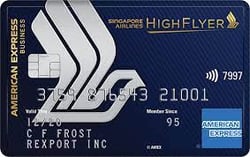AMEX Singapore Airines Business Credit Card: How Does It Stack Up Against Other Corporate Cards?
Updated: 11 Apr 2025
Overall, corporate credit cards tend to be outshined by personal credit cards – but it seems that the American Express Singapore Airlines Business Credit Card might beg to differ.
Written bySingSaver Team
Team

In this post on hacking business travel, MileLion generally discouraged against using business credit cards, citing that they should be avoided wherever possible.
According to him, corporate cards are typically created with companies in mind, not individuals. To that end, they offer things that companies value, such as lower processing costs, longer interest-free periods, and greater centralized control. If you want rewards and personal benefits, you’re looking in the wrong place.
It seems like AMEX has noticed this gap, which is why the American Express Singapore Airlines Business Credit Card was introduced.
What does the American Express Singapore Airlines Business Credit Card offer?
Here’s a rundown of what’s in it for the company and cardholder.
|
Benefits for company
|
Benefits for individual
|
|
|
Do note this card is meant for SMEs and is tied to the HighFlyer rewards scheme, SIA’s incentive program for companies with 30 or fewer corporate travellers.

How do other corporate cards measure up?
Truth be told, the American Express Singapore Airlines Business Credit Card doesn’t enter a particularly competitive market. The way I see it, here are its main competitors.
|
AMEX SIA Business Card
|
Citi Business Card
|
DBS World Business Card
|
Maybank Business Platinum Card
|
UOB Regal Business Metal Card
|
|
 |
 |
 |
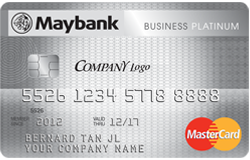 |
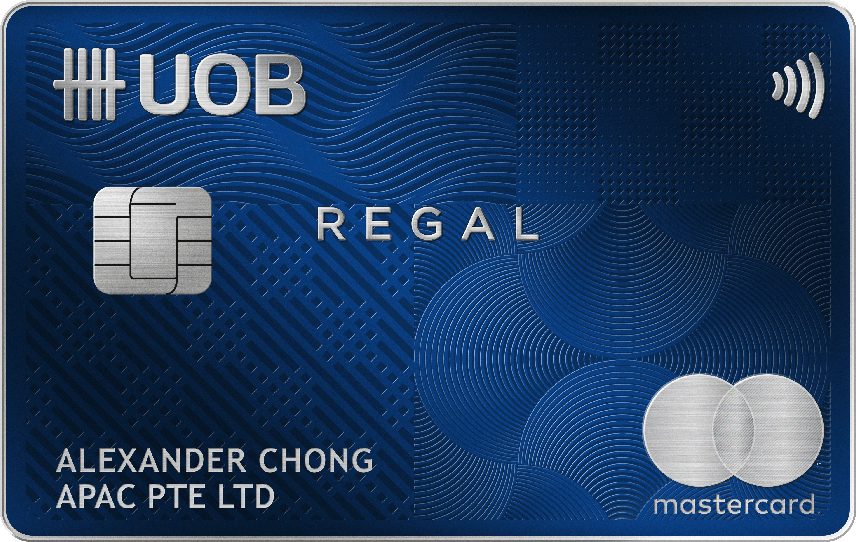 |
|
|
Annual Fee
|
S$301.80
|
S$162 (1 year waiver)
|
S$410.40 (1 year waiver)
|
S$180 (2 year waiver)
|
S$686.36
|
|
Earn Rate
|
8.5 HighFlyer points per S$1 on SIA-group purchases
1.8 HighFlyer points per S$1 on all other spend
|
S$1 = 0.8 miles
|
S$1 = 2 miles or 2% cash rebate on foreign currency
S$1 = 1 mile or 1% cash rebate on dining, entertainment and travel
S$1 = 0.3 miles or 0.3% cash rebate on all other spend
|
S$1 = 0.4 miles
|
2% cash rebate on dining and overseas spend
1.5% cash rebate on local retail spend
0.3% rebate on utilities
|
|
Lounge Access
|
2x free visits
|
No
|
10x free visits
|
No
|
Unlimited
|
|
Interest- free credit
|
51 days
|
55 days
|
N/A
|
51 days
|
N/A
|
|
Travel insurance
|
Yes
|
Yes
|
Yes
|
Yes
|
Yes
|
|
Other benefits
|
Accor Plus membership
Hertz Gold membership
Fast track to KF Elite Gold status
|
N/A
|
24/7 online reporting and expense tool
Limited-time business benefits
|
Global concierge services
Worldwide withdrawal services
|
Complimentary health screening services
Up to 20% off dining bills at selected restaurants
Exclusive wine deals & birthday perks
Complimentary Capella Hotels & Resorts perks
Complimentary greens fees
|
Interest-free credit and travel insurance are pretty self-explanatory so I won’t touch on them, but it might be useful to talk about some of the other features of corporate cards.
Earn Rate
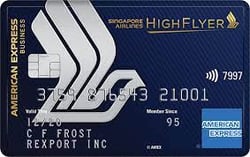
When talking about earn rates, it’s important to reiterate the primary beneficiary of a corporate card is the company, not the cardholder per se. Therefore, most corporate cards offer rebates that cut the company’s expenses, as opposed to miles that the cardholder can use for personal travel.
For example, spending on the American Express Singapore Airlines Business Card earns HighFlyer points, which offset the company’s future travel bill with Singapore Airlines. The cardholder will still earn miles from flying, but it’s not like using a personal card where he/she can also earn personal miles from payment. The HighFlyer administrator has the option to convert HighFlyer points into KrisFlyer miles at a 1:1 ratio for nominated employees, but otherwise all the rebates from spending accrue to the company.
Hence, 1 HighFlyer Point is equivalent to 1 KrisFlyer Mile directly.
Likewise, the UOB Regal card gives the company an effective cashback of 1.5 to 2% on dining, local and overseas spend. Since employees get reimbursed for company expenses anyway, the true beneficiary of this perk is the company.
The Citi Business Card, DBS World Business Card, and Maybank Business Platinum do allow the cardholder to accrue personal miles, but the rates are generally low.
Airport Lounge Access
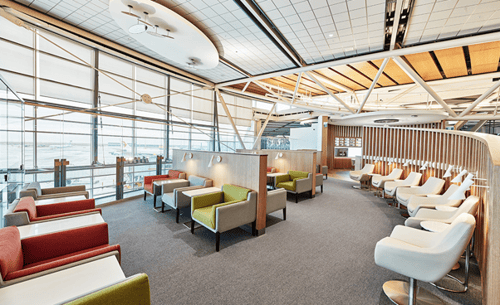
If you work for a company that flies you in Business Class, thank your lucky stars and read why not all business class sections are the same.
Otherwise, employees who are stuck at the back of the plane will appreciate the ability to relax in a lounge prior to departure. You could use the free visits given on cards like the Citi PremierMiles or the DBS Altitude (2 per year for both), but we imagine most people would want to save those for personal trips with family.
That’s why it’s good to note that certain corporate cards come with lounge access. The UOB Regal is the most generous with unlimited visits but also packs the highest annual fee, and it’s difficult to see an SME getting one of those for every employee.
The DBS World Business Card has 10 visits, but again the high annual fee means it’s more likely to be held by senior management and not rank and file.
The American Express Singapore Airlines Business Card has a more reasonable annual fee of $301.80, but only two free visits.
If you’re a frequent business traveller who wants lounge access, you’d do better by considering a personal card with unlimited lounge access (like the Citi Prestige).
Other benefits

One of the key benefits of the American Express Singapore Airlines Business Card offers an Accor Plus membership (worth S$418), a great personal benefit to get off a corporate card; for context, Accor Plus membership starts from US$225 per year – this is roughly S$306.35 per year.
Other exciting perks that Accor Plus members can look forward to include 10% off public room rates, up to 50% off Red Hot Room access, up to 50% off dining at participating restaurants in the Accor group, 15% off drink bills in Asia, a free night’s stay each year of membership (Explorer tier only), exclusive access to member-only events and much, much more.
Meanwhile, other cards like the UOB Regal Business Metal Card promise cardholders more perks on the health, dining, and leisure front.
UOB Regal cardholders are entitled to complimentary health screening services under Doctor Anywhere and Fullerton Health as well as 15% off ala carte food bills at selected Fullerton-affiliated restaurants and 20% off total dining bills at selected Pan Pacific Hotels Group properties and restaurants. Not to mention, cardholders also get to enjoy complimentary golf games under the Mastercard Southeast Asia Golf Program, which gives access to courses such as the Sentosa Golf Club in Singapore.
Conclusion

All things considered, a business credit card seems to perform all the same functions and features that a personal credit card can. It seems that there's not much difference from using a personal card itself for company expenses if you're allowed to. Ultimately, this brings us back to the point that the cardholder should be the one to benefit the most from using the card, not the company. (Unless you're selfless and don't mind all your hard-earned miles and rewards funnelling directly towards company usage – if that's the case, all the power to you!)
Otherwise, there’s nothing sweeter than hitting all your sign-up bonuses with spending that gets reimbursed while pocketing the miles for a future vacation.
At the same time, we have to acknowledge that not everyone is in a position to do that. If your finance department insists you use a corporate card, it’s best to bite the bullet and follow their instructions. But be sure to highlight some other alternatives, as shown here!
About the author
SingSaver Team
At SingSaver, we make personal finance accessible with easy to understand personal finance reads, tools and money hacks that simplify all of life’s financial decisions for you.
